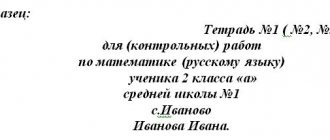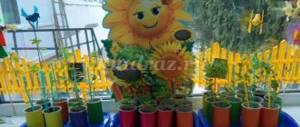Eco-Instructions: how to conduct an eco-lesson at school
How to interest modern children in an environmentally friendly lifestyle? How to conduct a useful and educational eco-lesson in a simple and fun way? Experts of the ECA movement spoke about this at the webinar - coordinator of the all-Russian project Ekoclass.rf Elvira Zinatullina and coordinator of the Ekoviki project Yulia Burdo.
About the lessons
Now the Ekoklass.rf portal contains eco-lessons for children of all ages, from preschoolers to high school students. They can be accessed by both teachers and parents, or simply volunteers who want to conduct such classes. In order to use the materials, you need to go through a simple registration on the site or log in through social networks.
The topics of the lessons are very different: “The Future of Baikal”, “The Seas of Russia. Preservation of marine ecosystems,” a lesson about the circular economy, reducing the ecological footprint and proper waste management, how home improvement and household habits affect the well-being of the planet and all its inhabitants, saving water and energy, new technologies for the environment, “green” professions of the future and a lot others.
In total - 20 all-Russian and international lessons on various topics. According to statistics, about 40 thousand teachers take part in each of them. About 2 million students have already taken part in the classes.
“Now more than 60 thousand teachers are registered on the Ekoclass.rf portal, they use our materials and conduct classes using them. Among them are not only teachers from Russia, but also from the CIS countries. Just recently, a Russian-speaking school at the Thai Embassy joined us, and even there our lessons are in demand,” said Elvira Zinatullina, coordinator of the all-Russian project Ecoclass.rf.
The lessons are universal and can be printed and taught by anyone. The materials are created by professional teachers and methodologists, biologists, environmentalists, designers and IT specialists.
You can go into each lesson, see what it's about, read about it, see how many people have joined it, how many teachers are teaching it, how many parents have watched it. Each lesson has an interactive map that shows how many schools have conducted classes on a particular topic. There are also teaching cards and videos lasting 5-10 minutes.
During this time, you can understand how to conduct the lesson; the video describes in detail each stage of its implementation, what you should pay attention to, what materials to print in what quantity. This is a methodological guide in the form of step-by-step instructions. Classes can be filtered by age category or topic.
“Once you get into your personal account, you can view and then download all the materials. Each kit includes a methodological guide that describes the stages of implementation, and there is also interlinear text for the animated presentation. Each lesson has a colorful presentation that can be downloaded. All text information is also in the guide. Plus, you can add regional components yourself and talk about the current situation in your city, for example. All materials can be adapted to suit yourself. The set contains cards for carrying out game tasks. They look different in all lessons. The sets are not repeated: somewhere a board game is presented, somewhere an “adventure game”, somewhere a business game, an outdoor game, etc. Each lesson has its own set of materials,” said Elvira Zinatullina.
All lessons are built in an interactive format: the teacher communicates with the children, conducts a dialogue with them, and does not just give a lecture and load the children with facts. He asks what they already know about the topic and what they would do in a given situation.
In the games, children try to cooperate with each other and independently develop solutions to environmental problems. The teacher does not give knowledge in a ready-made form, the students obtain it themselves, thereby the information received becomes more valuable and memorable.
According to Elvira Zinatullina, eco-lessons can be conducted for children from the age of five. Educators simplify them a little, adapt them and conduct them in preschool groups.
Where to begin
The simplest and most understandable way to start communicating with children on the topic of ecology is water conservation, say the authors of the Ecoclass.rf project. After all, water is the basis of life on Earth, everyone has it in their home, and it’s worth starting classes with this topic.
A few simple steps for those who want to conduct an eco-lesson:
- register on the Ecoclass.rf portal and choose the role of a teacher, parent or volunteer;
- choose a lesson on a topic of interest and receive a complete set of materials;
- determine where and for whom you will conduct the lesson;
- make an announcement in your personal account on the Ekoviki website;
- study materials and teach a lesson;
- share your experience of conducting a lesson in your personal account on the Ekoviki website and social networks with the hashtags #ecolesson #ecoclass.
“You choose the lesson you like on the Ekoclass.rf website, then you need to understand for which audience you will hold the event: for what age and on what platform. This could be a school, a city club, or a family club. You can conduct a rehearsal of an eco-lesson at home, for your family, this will become a test of the material for you and then you will be able to more confidently teach it to a large audience,” said Yulia Burdo, coordinator of the “Ekoviki” project.
It is proposed to announce your events on the Ekoviki website. Of the two roles - volunteer and organizer - you choose the role of organizer, fill out a short form and go to the “My eco-lessons” section. There is a “Create a new activity” button here. In this section, you can specify the location where the event will take place, create a short description for it and indicate the date. Then click the “save” button and the event card will appear in your personal account. After the lesson, you can share your successes and achievements with other portal users.
According to Yulia, to conduct an eco-lesson you will need helpers - volunteers: “Once you have created your lesson on the site, it will be displayed on the all-Russian map of the project and will become visible to everyone, a volunteer can register and join you. Or the organizer can ask people they know to join as volunteers, register on the website and help run the class.”
Elements of the script and teaching materials can be used in other activities. For example, within the framework of the “Ecodvor” project for conducting environmental educational events in the yard, on city sites, in public gardens and parks, for conducting lectures and master classes.
“An eco-lesson using our materials will fit very organically into the format of such a holiday,” Yulia is sure.
How to come to school and conduct an eco-lesson
Even if you are not a teacher, but just a parent or volunteer, you can come to the school with specific suggestions and tell them how to become more environmentally friendly. Often people simply don't know how to do this.
“For example, few people know that by collecting recyclables separately from general waste, you can reduce utility bills. The school becomes interested when it understands its benefits. Or you are well versed in a certain topic, for example, you know how to create school forest nurseries; you can also come to school with this initiative. This may also be interesting for them as a long-term project, when the administration and the children themselves take patronage over the nursery and develop it as their own school mini-project.
You can also encourage students to stop using disposable items. This year, for example, there was a wave of refusal from disposable cups. Every school has coolers and this topic will be relevant. For example, you can offer to give all children personalized mugs or install drinking fountains without using cups,” shared Elvira Zinatullina, coordinator of the all-Russian project Ecoclass.rf.
How can you still come to school and conduct your eco-lesson? The conduct of such a lesson can be agreed upon with one teacher, for example, with the class teacher, and it is better to communicate directly with the school principal about the introduction of systemic practices. It is advisable to structure the dialogue in such a way as to most clearly show the benefits of introducing any practice.
If you are not ready to immediately communicate directly with the director, then it is better to enlist the support of equally caring parents, conduct a survey in the parent chat, talk with the child’s class teacher, find out what he thinks about your initiative.
“If you have the support of a teacher, and not just parents, this is doubly good and more effective in a conversation with the director,” says Elvira Zinatullina. – It is necessary to show that this is not something burdensome for the school, but a useful practice, to show the specific benefits of introducing this or that initiative. It’s also good to refer to some examples. For example, if you know that environmental practices have already been introduced in your area or at some school, it is better to talk about it, how well it works, or find information about similar examples on websites and social networks, about successful experiences schools."
About diplomas and certificates
Each lesson organizer (teacher or parent) and volunteer can receive a diploma confirming that he conducted an eco-lesson, and certificates of participation are provided for children.
After submitting a simple report on the website in the form of the best photographs and feedback, you will receive a participant diploma and a letter of gratitude to the school. In addition to a diploma, children receive a folding pocket book as a gift, which they assemble themselves during class.
It contains useful tips and information on the topic, recommendations for watching interesting films, a list of books, etc. This is not just a piece of paper, but a tool for further use and practical application.
Photo: https://vk.com/ecoschools
Subscribe to our channel on Telegram! t.me/recyclemagru
Lessons on ecology
Create your teacher website PC and PPC courses Video lessons Olympiad Webinars for teachers
- home
- Ecology
- Lessons
Watch and download free lessons, tests, notes, presentations and other useful materials on ecology for teachers and students. In this section you can get lessons on ecology .
- All 359
- Lessons 61
- Presentations 65
- Tests 11
- Planning 19
- Events 67
- Other 136
- All classes
- For preschoolers
- 1 class
- 2nd grade
- 3rd grade
- 4th grade
- 5th grade
- 6th grade
- 7th grade
- 8th grade
- 9th grade
- Grade 10
- Grade 11
| “Sad time of drawing eyes” give children an idea of the preparation of wild animals about the reasons for the changes in their lives in the fall... 09.21.2020 Shapkina Svetlana Yurievna 57 0 |
| “Club of Young Ecologists” To introduce the environmental problems of planet Earth, the interconnection between nature and man, and to develop an interest in nature conservation. ... 09.21.2020 Shapkina Svetlana Yurievna 72 0 |
| Sustainability and development Topic: “Sustainability and development.” Goal: The importance of Sustainable Development for humanity. Study global environmental problems and ways to solve them.... 04/29/2020 Vinogradova Elena Veniaminovna 137 0 |
| “Children are heroes of Victory” Fostering patriotic feelings of older preschoolers... 03/15/2020 Shapkina Svetlana Yurievna 307 0 |
| “We are defenders of nature” Increasing the environmental culture of children, nurturing a culture of love for nature... 06/17/2020 Shapkina Svetlana Yurievna 144 0 |
| Lesson “Indoor Plants” Introduction to the appearance and care of indoor plants: violet and chlorophytum. ... 05/17/2020 Ivanova Elena Nikolaevna 119 1 |
| Oral journal “Inhabitants of protected areas: Arctic” What animals live in the Arctic? It is not difficult to imagine what kind of adaptability the organisms existing there must have, forced to spend a difficult winter among the snow and scorching cold... 02/18/2020 Makarova Nina Yurievna 118 1 |
| “The nature of my land” Systematize children’s knowledge about the forest as a natural community. Consolidate knowledge about the seasons…. 02.02.2020 Shapkina Svetlana Yurievna 129 1 |
| Oral journal “Inhabitants of protected areas: Antarctica” Antarctica is a continent with harsh climatic conditions. The temperature on most of the continent never rises above freezing point, and the entire continent... 02/18/2020 Makarova Nina Yurievna 148 0 |
| Characteristics of the main sources of pollution and substances. Usually, when talking about pollution, they mean anthropogenic pollution and evaluate it by comparing the power of natural and anthropogenic sources of pollution. Due to large quantities I am receiving... 01/18/2020 Tokmakova Olga Aleksandrovna 145 1 |
| Kysky agashtar. Shyrsha -Balalar myna surette not beinelengen? -Iya, balalar, agashtar. Agashtyn turleri ote kop. Olar mysaly emen, kaiyn, үyenki. Terek, shyrshy, zhemis agashtary. 12/22/2019 Ospanova Bota Serikbaevna 189 1 |
| Summary of a lesson using active forms “Colors of Spring” for primary school students Today our lesson is dedicated to a wonderful time of year - spring. What changes in nature have you noticed with the arrival of spring? And what... 02/18/2020 Makarova Nina Yurievna 166 0 |
| Ecological quest-game “Tsvetik-Seven-Tsvetik” Ecological quest-game “Tsvetik-Seven-Tsvetik” for children of the middle group. Modern form of classes... 02/18/2020 Kassirova Olesya Aleksandrovna 218 1 |
| “Take care of this world” Lesson in the form of a game. The class is divided into 2 or 3 teams. Categories of questions on the screen. Questions based on difficulty level correspond to points. The team with the most points wins... 01/18/2020 Atyaskina Vera Sergeevna 247 2 |
| Ecology and culture This lesson is about the connection between ecology and culture - the future of Russia... 01/10/2020 Rychkova Olga Evgenievna 218 3 |
| Industrial ecology and other sciences. Natural resources, their classification. Recently, human ecology has been developing, which includes a number of social problems. Natural resources used by humans are diverse, their purpose and origin are varied... 09.26.2019 Tokmakova Olga Aleksandrovna 181 1 |
| Open lesson “Water in my home and nature” The development was created for beginning teachers of additional education in Ecology. For 5th grade students. ... 01/30/2020 Turalieva Yulia Viktorovna 463 3 |
| “Forest Animals” Expand and consolidate ideas about the peculiarities of the appearance of wild animals... 12/10/2019 Shapkina Svetlana Yurievna 868 1 |
| Global environmental problems and their sustainable development. Continuous technological progress, the ongoing enslavement of nature by man, industrialization, which has changed the surface of the Earth beyond recognition, have become the causes of the global environmental crisis... 12/05/2019 Tokmakova Olga Aleksandrovna 376 3 |
| Ecological groups of plants in relation to water The lesson of studying new material is held in the 6th grade in the course “Plant Ecology”, in the second quarter. This course “Plant Ecology” is developed on the basis of regional programs… 01/07/2020 Dikun Vera Vyacheslavovna 294 2 |
- ← Back
- Continue →





